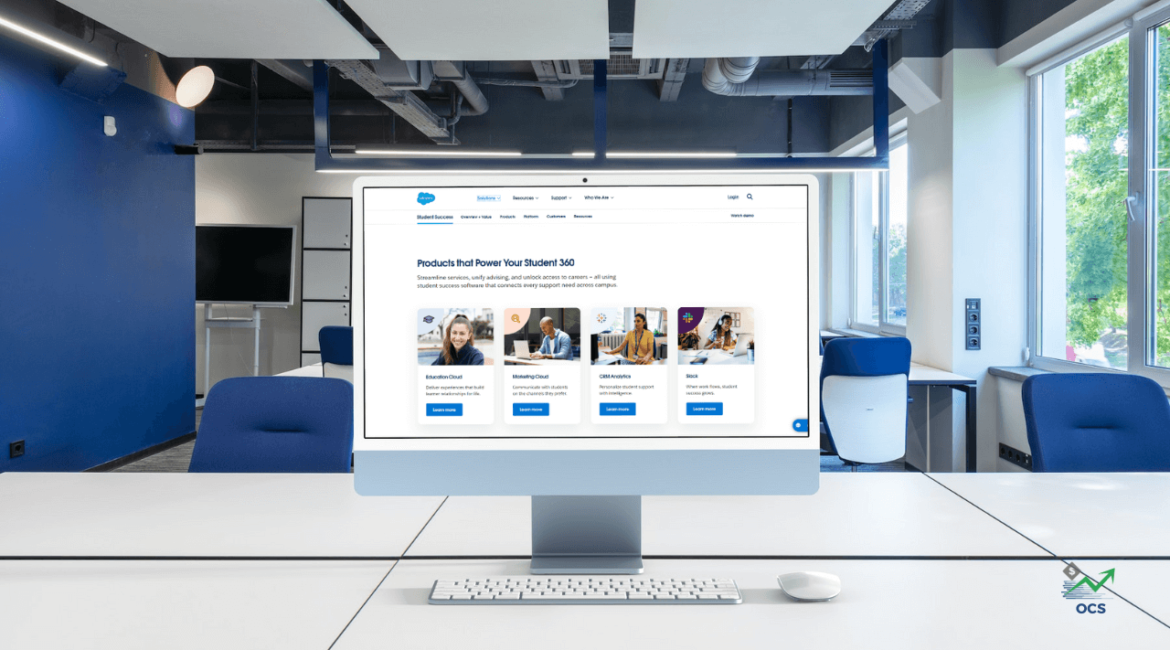In today’s digital era, Salesforce customer management has emerged as a game changer. Streamlining sales and improving the customer experience are essential objectives for any business.
Leveraging the power of Salesforce’s robust platform can help businesses drive sales, foster customer loyalty, and achieve long-term growth.
With its variety of tools and features, Salesforce gives businesses the ability to manage customer relationships, track sales pipelines, and analyze data effectively.
However, to truly harness the potential of Salesforce, companies must adopt best practices tailored to their specific needs.
In this article, we’ll explore Salesforce customer management best practices that can speed sales and improve the customer experience.
Whether you’re a small business or a multinational corporation, understanding how to leverage Salesforce’s capabilities can have a significant impact on your bottom line.
Join us as we guide you through Salesforce customer management best practices and help you unlock the full potential of your business.
Key features and benefits of Salesforce for customer management
Salesforce offers a wide range of features and benefits that make it an indispensable tool for customer management.
From lead management to data analysis, Salesforce provides businesses with the tools they need to streamline sales and improve the customer experience.
Salesforce CRM
A key feature of Salesforce is its robust customer relationship management (CRM) system.
With Salesforce CRM, companies can easily manage and track their customer interactions, ensuring no lead or opportunity is missed.
CRM system allows companies to store customer data, track communication history and analyze customer behavior, allowing them to adapt their sales strategies and marketing efforts accordingly.
Sales and marketing automation tools
In addition to its CRM system, Salesforce also offers powerful sales and marketing automation tools.
These tools automate repetitive tasks like lead nurturing and follow-up, freeing up sales teams to focus on building relationships and closing deals.
By automating these processes, companies can increase efficiency, reduce manual errors, and speed up the sales cycle.
Data analysis
Additionally, Salesforce offers companies valuable data analysis capabilities.
With Salesforce reporting and analytics tools, companies can gain insights into their sales pipelines, track key performance indicators (KPIs), and identify areas for improvement.
This data-driven approach allows companies to make informed decisions, optimize their sales processes and drive revenue growth.
Overall, Salesforce’s key features and benefits, including its CRM system, sales and marketing automation tools, and data analytics capabilities, empower businesses to effectively manage their customers, streamline sales processes, and enhance the customer experience. client.
Streamlining sales processes with Salesforce

One of the primary goals of Salesforce customer management is to streamline sales processes. By optimizing and automating sales workflows, businesses can increase efficiency, improve productivity, and drive revenue growth.
Here are some best practices for streamlining sales processes with Salesforce.
Best practices for setting up Salesforce for customer management
Setting up Salesforce for customer management involves a strategic approach to ensure efficient operations and effective customer relationships. Here are some best practices to consider:
Define Clear Objectives
Begin by outlining your specific goals and objectives for using Salesforce as a customer management tool. Whether it’s improving lead generation, enhancing customer service, or increasing sales, clarity on objectives will guide your setup process.
Customize for Your Needs
Salesforce offers extensive customization options to tailor the platform to your unique business requirements. Utilize custom fields, objects, and layouts to capture relevant customer data and streamline processes.
Implement Data Quality Measures
Data accuracy is crucial for effective customer management. Establish data quality measures such as validation rules, data cleansing procedures, and duplicate management to maintain clean and reliable data within Salesforce.
Utilize Automation
Leverage Salesforce automation features such as workflows, process builder, and approval processes to automate repetitive tasks and streamline workflows. Automation improves efficiency, reduces manual errors, and enables proactive customer engagement.
Integrate with Other Systems
Salesforce integrates seamlessly with various third-party applications and systems. Integrate Salesforce with your existing tools such as marketing automation platforms, ERP systems, or customer support software to create a unified view of customer data and streamline operations.
Train Users Effectively
Proper user training is essential for successful Salesforce implementation. Provide comprehensive training sessions to users on how to navigate Salesforce, input data accurately, and utilize key features relevant to their roles.
Continuously Monitor and Optimize
Regularly monitor Salesforce usage, data quality metrics, and user feedback to identify areas for improvement. Continuously optimize your Salesforce setup based on evolving business needs, technological advancements, and industry best practices.
By following these best practices, you can effectively set up Salesforce for customer management, empowering your team to deliver exceptional customer experiences, drive sales growth, and foster long-term customer relationships.
Tips for effective data management in Salesforce
Effective data management is crucial for maximizing the benefits of Salesforce. Here are some essential tips to ensure optimal data handling within the platform.
- Define Data Governance Policies: Establish clear guidelines for data entry, validation, and access control. Define roles and responsibilities to ensure accountability and compliance.
- Understand Your Data: Gain a comprehensive understanding of your data structure, including objects, fields, and relationships. This insight helps in designing a robust data management strategy aligned with your business objectives.
- Cleanse and Standardize Data: Regularly audit and cleanse your data to remove duplicates, inaccuracies, and inconsistencies. Standardize naming conventions, formats, and values to maintain data integrity.
- Implement Validation Rules: Enforce data quality by implementing validation rules that ensure accurate data entry. Validate fields based on specific criteria to prevent errors and maintain data consistency.
- Utilize Import Tools: Leverage Salesforce’s import tools to streamline data migration and updates. Use Data Loader or Salesforce Import Wizard for efficient data loading while adhering to best practices.
- Customize Data Model: Customize Salesforce’s standard data model by creating custom objects and fields tailored to your organization’s unique requirements. This flexibility allows you to capture and manage data effectively.
- Ensure Data Security: Implement robust security measures to safeguard sensitive data. Utilize role-based access controls (RBAC), profiles, and permission sets to control user access and permissions. Employ encryption and data masking techniques to protect data at rest and in transit.
- Monitor Data Quality: Continuously monitor data quality metrics and establish data quality dashboards to track key indicators. Identify and address data discrepancies promptly to maintain high-quality data.
- Provide User Training: Invest in comprehensive user training programs to educate users on data management best practices. Empower users with the knowledge and skills required to input, update, and maintain data accurately.
- Regularly Review and Improve: Regularly review data management processes and policies to identify areas for improvement. Solicit feedback from users and stakeholders to refine data management practices continually.
By implementing these tips, organizations can ensure effective data management in Salesforce, leading to improved data quality, enhanced productivity, and better decision-making capabilities.
Integrating Salesforce with other business tools for seamless customer management

Integrating Salesforce with other business tools is essential for achieving seamless customer management and improving overall operational efficiency.
By connecting Salesforce to various tools and systems across your organization, you can streamline processes, improve data visibility, and deliver a superior customer experience.
Key Benefits of Integrating Salesforce with Other Business Tools
- One of the key benefits of integrating Salesforce with other business tools is the ability to centralize customer data.
By syncing Salesforce with your CRM, marketing automation, and support systems, you can ensure all customer interactions and information are captured and stored in a single, centralized location.
This unified view of customer data allows your team to gain valuable insights into customer behavior, preferences, and needs, enabling more personalized and targeted engagement.
Additionally, Salesforce’s integration with other business tools enables a seamless flow of data between systems, eliminating manual data entry and reducing the risk of errors.
This automation of data transfer ensures data accuracy and consistency across your organization, leading to better decision-making and operational efficiency.
Additionally, integrating Salesforce with tools like email marketing platforms, e-commerce systems, and social media management tools allows for more effective marketing and sales campaigns.
By leveraging data from these systems, you can create highly targeted marketing campaigns, track customer interactions across multiple channels, and measure the effectiveness of your marketing efforts.
- Another benefit of integrating Salesforce with other business tools is the ability to automate workflows and processes.
By connecting Salesforce with tools like project management software, task automation platforms, and collaboration tools, you can streamline internal processes, improve team productivity, and ensure tasks are completed in a timely manner.
Overall, integrating Salesforce with other business tools is essential for achieving seamless customer management and driving business growth.
By centralizing customer data, simplifying processes and automating workflows, organizations can deliver a superior customer experience and gain a competitive advantage in today’s digital landscape.
Training and resources for maximizing Salesforce for customer management [H2]
To maximize the potential of Salesforce while optimizing costs, investing in comprehensive training and resources is essential. Salesforce offers a plethora of training programs and resources aimed at empowering users to leverage the platform effectively.
Salesforce Trailhead, the free online learning platform, provides interactive modules and guided learning paths covering various aspects of Salesforce. Users can explore topics such as sales, marketing, customer service, and analytics at their own pace, earning badges and credentials along the way. This self-paced learning option allows organizations to train their teams efficiently without incurring additional costs.
In addition to self-paced learning, Salesforce offers instructor-led training courses delivered by certified experts. These courses provide structured learning experiences, covering topics such as administration, configuration, and integration in-depth. Pursuing certification further validates expertise and proficiency in specific areas of the platform.
However, navigating the complexities of Salesforce licensing can be daunting. Many organizations unknowingly overspend on licenses they don’t fully utilize. That’s where our consultancy services come in. OCS – Org Cost Savings specializes in optimizing and reducing costs associated with Salesforce licenses. By conducting a thorough assessment of your Salesforce usage, we identify areas for optimization and provide tailored recommendations to minimize unnecessary expenses.
In addition to training and consultancy, organizations can benefit from online resources, user communities, and forums where they can connect with peers, share best practices, and seek advice. By leveraging these resources alongside our consultancy services, organizations can ensure they’re maximizing the value of Salesforce while minimizing costs.
investing in training and resources is crucial for maximizing Salesforce’s potential. By raising awareness about the importance of cost reduction and suggesting our consultancy services, organizations can achieve optimal results and drive success in their Salesforce initiatives.
Conclusion
Salesforce customer management provides businesses with powerful tools to streamline sales and enhance the customer experience.
By adopting the best practices outlined in this article, businesses can optimize lead generation, enhance conversion processes, and implement effective customer service strategies.
Whether you are a small business or a multinational corporation, leveraging Salesforce’s capabilities can help you unlock your business’s full potential and achieve long-term growth. Take the first step towards Salesforce customer management success and see the positive impact it can have on your business.



I just could not leave your web site before suggesting that I really enjoyed the standard information a person supply to your visitors Is gonna be again steadily in order to check up on new posts
Thank you for your comment. We are committed to continuing to bring content to help companies reduce costs with Salesforce.
Attractive section of content I just stumbled upon your blog and in accession capital to assert that I get actually enjoyed account your blog posts Anyway I will be subscribing to your augment and even I achievement you access consistently fast
Thank you for your comment. We are committed to continuing to bring content to help companies reduce costs with Salesforce.